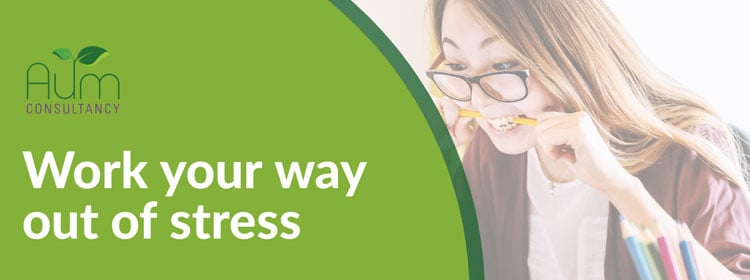This week is International Stress Awareness week, so we are casting the spotlight on work-related stress and helping you overcome it. We all have the right to a happy, productive and fulfilling work life. It’s up to your employer and yourself to come together to make this happen.
The Health and Safety Executive (HSE)’s latest Labour Force Survey revealed that 49% of all UK working days lost in 2016-2017 were due to work-related stress, depression or anxiety. This figure has been steadily increasing for ten years and really highlights the severity of the issue. Some of the most eye-opening statistics from the survey included:
- Just 9% say they ‘never’ experience work-related stress, while only 12% consider the levels of work-related stress they experience as ‘low’
- Over one in five UK workers experience moderate to high levels of work-related stress
- 72% of higher earners (those earning over £40,000) experience work-related stress
- Almost half (45%) of UK workers say that their place of work does not have anything in place to help reduce employees’ stress levels and improve their mental well-being
- Just 8% of workplaces offer counselling services to staff, 6% offer stress management and/or resilience training and 9% arrange regular one-to-ones with managers.
High levels of work stress were experienced fairly broadly throughout the UK – with workers in Welsh cities, the Midlands, the South East and the North West reporting the highest percentage of cases.
Spot the signs
Stress hormones are released when we are faced with pressure or feel threatened. Cortisol releases energy and increases alertness, preparing us for fight or flight. When this energy is released and the situation is resolved, hormone levels return to normal.
However, when cortisol builds up in the bloodstream, the negative impact is experienced in many ways:
Physically – Raised blood pressure, raised blood sugar levels, tension and muscular pain, headache, chest pains, rapid heart rate, digestive problems, nausea, sexual problems, lowered immunity, sleep problems, low energy.
Mentally – Difficulty in concentrating, memory problems, poor judgement, difficulty in making decisions, negative thoughts, racing thoughts, irrational fears, worry.
Emotionally – Moodiness, irritability, lowered self-esteem and loss of confidence, feeling overwhelmed, feeling generally unhappy or depressed, hopelessness, tearfulness, agitation, anxiety, wanting to avoid others.
Behaviourally – Comfort eating, not eating or eating badly, using alcohol, cigarettes and recreational drugs, procrastinating, delaying going to bed or napping too much, isolating, snapping at others, being angry.
Unsurprisingly, these negative impacts often adversely affect your work performance in many ways, including absenteeism, presenteeism, not meeting deadlines, apathy, lack of motivation, complaining, lack of enthusiasm and being difficult with colleagues.
The good news is that we can choose how we behave, and we can choose ways of discharging that cortisol and looking after ourselves better. The first step is to take responsibility to work the stress out of your body.
According to Health and Safety law, it is a joint responsibility between you and your employers to address stress that impacts on your work.
Firstly, let us look at what you can do.
Physical activity can reduce cortisol and release endorphins. Try to take brief, frequent breaks from your desk or workstation, to walk or do some relaxation exercises.
A good idea is to build more activity into your daily routine – walk rather than drive short distances, use the most distant parking place, get off the bus a stop earlier, use stairs, not the lift, move around if it is appropriate while you are on the phone et al.
Relaxation techniques are greatly beneficial and after some practice can be easily integrated into a busy routine.
Breathing exercises, meditations, yoga, t’ai chi are proven to reduce stress. Relaxing the body frees the mind, and helps you stay clear and focussed.
A specific form of meditation is Mindfulness. Mindfulness gives you the tools to focus on being in the moment, not worrying about the past or the future. It relaxes and revives, calms body and mind and enables clearer thinking.
Here are some simple techniques that can be done anywhere, at your desk, on the bus/train or at home.
- Take your attention into your body and focus on your breath. Notice the movement of your breath in your body, the rise and fall of your chest and your belly as you breathe in and out. Just observe this movement for 0 – 15 breaths
- Take a few deep breaths every half hour
- A body scan is where you progressively relax each part of your body in sequence. Start with relaxing your face. Then relax your neck, arms and hands, shoulders, torso, legs, feet and toes.
Having taken responsibility for your own health and wellbeing, make sure your employer is also taking the right steps to apply their legal duty of care towards you.
Speak to your manager who should be trained in spotting the signs of stress and the procedures to support you. Ideally, a Stress Risk Assessment (SRA) should be carried out by your manager according to the management standards laid out in the guidance by the Health and Safety Executive.
Your manager should consult Human Resources and Occupational Health advisors to develop a strategy to address the issues.
Stress Risk Action Plan
If you are experiencing workplace stress, there are 6 main sources of support available to you:
- Yourself! Take responsibility for your health and engage in daily stress-reducing activities
- Speak to your manager about the employer’s duty of care and request a stress risk assessment
- Speak to your Human Resources department and/or look up your company policies and procedures relevant to stress and well-being
- See your GP who can formally make recommendations to your manager and occupational health
- Consider seeing a counsellor – In addition to doing the above, it is often helpful to talk to a professional about your distress. If your employer does not have an employee assistance programme you can contact your GP or the British Association of Counselling and Psychotherapy for a counsellor in your area. Other voluntary organisations such as MIND can also offer support.
- Speak to trusted friends and family.
The last thing you want to do is to keep it to yourself, instead, share it and get it sorted out!

